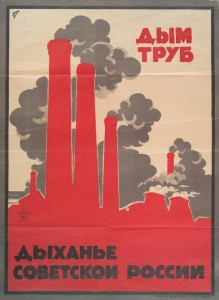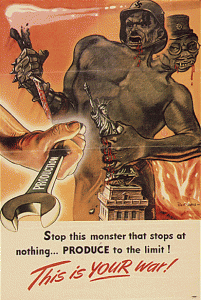With the rise of literacy in Russia, literature became a more effective way to spread ideas throughout the people. Poetry stands out from the other forms here due to it’s rhythm. It is easier to remember stanzas of poetry than prose. This makes poetry a fantastic way to spread revolutionary ideas as well as the cost of the revolution.
Maksimilian Voloshin writes about how often progress is reached by some sort of sacrifice. In his poem, “Holy Russia” he describes the destruction that has come as a result of the revolution. “You yielded to passion’s beckoning call, And gave yourself to bandit and to thief, You burned your barns and fired your mansions, Pillaged your ancient house and home, And went your ways reviled and wretched, The handmaid of the humblest slave.” (( Voloshin, Holy Russia, http://soviethistory.msu.edu/1917-2/culture-and-revolution/culture-and-revolution-texts/holy-russia/ )) Voloshin tells of a Russia that has been torn apart by revolution, but that has the ability to make tremendous progress, something that would be positive to hear after years of brutal civil war.
Meanwhile, poets such as Kirillov and Gastev wrote on the glorious aspect of the revolution that came out of industrialization. In the poems, “Iron Messiah” and “We Grow Out of Iron” a new, magnificent future is made possible by the revolution, which was made possible by the machine. The machine allowed the proletariat to rise, and it will continue to allow for equality. Kirillov writes, “All of steel, unyielding and impetuous; He scatters sparks of rebellious thought,” this emphasizes the importance of technology in the minds of the revolutionaries. ((Kirillov, Iron Messiah, http://soviethistory.msu.edu/1917-2/culture-and-revolution/culture-and-revolution-texts/the-iron-messiah/ )) The machine represents power, equality, and progress, all which were goals of the revolution. This can be seen in the writing of Gastev, “I shall not tell a story or make a speech, I will only shout my iron word: “Victory shall be ours!”” ((Gastev, We Grow Out of Iron)) The use poetry to expand this message to the people emphasizes the importance of continuing to produce for the state using the technology that set them free.
These poets help to inspire the people that this suffering during the revolution is for a greater cause, but also that the very machines that made their lives harsh were the ones that liberated them. I think it is very interesting how the description and imagery of heavy machinery would fit right into a Western capitalist propaganda ad, but it can also be used to inspire the workers.

“The smoke of chimneys is the breath of Soviet Russia” https://en.wikipedia.org/wiki/History_of_the_Soviet_Union_(1927–53)

